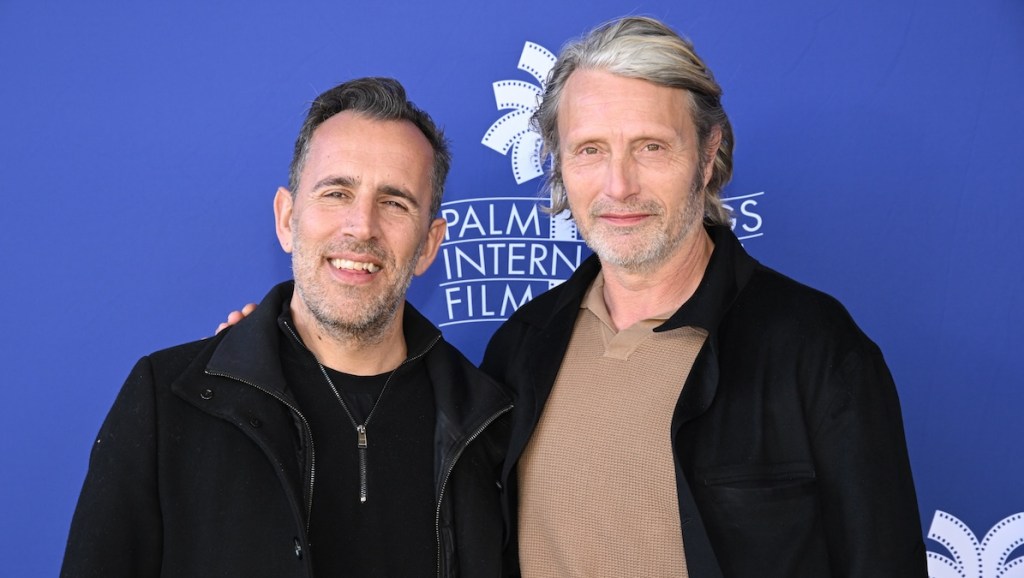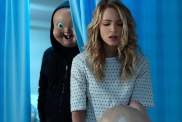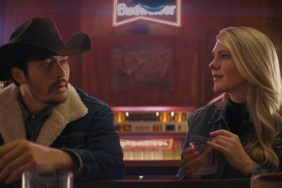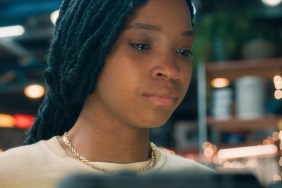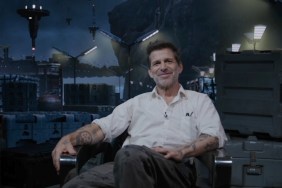ComingSoon Editor-in-Chief Tyler Treese spoke with The Promised Land director Nikolaj Arcel about reuniting with Mads Mikkelsen on his latest drama. The film is Denmark’s official submission for Best International Feature Film for the 96th Academy Awards. It will be released in theaters in the United States by Magnolia Pictures on February 2, 2024.
“In 18th century Denmark, Captain Ludvig Kahlen (Mads Mikkelsen) – a proud, ambitious, but impoverished war hero — sets out to tame a vast, uninhabitable land on which seemingly nothing can grow. He seeks to start farming crops, build a colony in the name of the King, and gain a noble title for himself,” says the synopsis. “This beautiful but forbidding area also happens to be under the rule of the merciless Frederik De Schinkel, a preening nobleman who realizes the threat Kahlen represents to his power. Struggling against the elements and local brigands, Kahlen is joined by a couple who have fled the clutches of the rapacious De Schinkel. As this group of misfits begins to build a small community in this inhospitable place, De Schinkel swears vengeance, and the confrontation between him and Kahlen promises to be as violent and intense as these two men.”
Tyler Treese: I wanted to ask about the first death that is shown in the forest. It’s quite sudden, and it’s shown very matter-of-factly. You don’t dwell upon it. It really underscores just the harshness of reality of that time period and how fragile life is. Can you speak to just showing that sudden murder that occurs and then simply moving on with the story?
Nikolaj Arcel: It’s actually interesting you should ask that question. I haven’t done a lot of brutality in my earlier films. They’ve been slightly more polished in that sense. And I felt that this film really needed to show how it really was in those days. There’s not a lot of value on human life if you’re attacked, you know — it’s either you or the person that attacks you.
And so, even though it’s our protagonist, I still wanted it to feel like that’s just how it goes. If you travel through the forest, somebody attacks you, this person gets shot… and you just move on. That’s just how it is. And I thought that was an effective way also to show that our main character is somebody who’s been in the army for 25, 30 years. This is almost every day for him.
You’ve worked with Mads before, so obviously, you have that great working relationship, and you know what he brings to the table. But what made you so confident that he would be the perfect fit for the role of Ludvig?
I think Mads, honestly, can play everything. He’s one of the greatest actors of our time and not just the greatest Danish actors. Just having him is really lucky. I think he was a perfect fit for the role. Seeing as the kind of guy that Luke is, the kind of journey he has.
This is adapted from a novel. When I read the novel, it was five pages into it. I went like, “Okay, this needs to be Mads or nothing.” I just didn’t think I could do this film without him. So basically, I called him up having read almost half the book. I said, “I have this project — are you interested in doing that?” I think he’s got a subtlety of performance and such an intensity that — to me — he really is the film. He’s everything in this film.
Frederik is just beyond evil in this movie. When he throws the maid out of the window… I was not expecting that. How did you go about portraying this character as just as rotten as can be?
Yeah, he certainly was rotten. One of the cool things was to have an antagonist with that kind of modern view on life. He keeps saying life is chaos, right? While Mads’ character keeps saying, “No, you can control life.” I actually believe that life is chaos. So, I kind of find myself agreeing a little more with the antagonist.
I always found it fun to have an antagonist that was maybe — and Mads will probably kill me for saying this — a little bit smarter than the protagonist. So that was, that was interesting. And he’s based on a real person, we did a little research. He was a horrible, horrible person. He was a tyrant. He was brutal to his subjects. So, a lot of it was actually drawn from real life. Even some of the ways that he tortured his peasants. That was something that we found out he did in real life.
That’s wild. Earlier, you touched on the philosophical aspects. I love that dinner scene where Mads and both of the characters are going back and forth, talking about chaos. I thought that was such a fascinating exchange. What did you like most about getting their different philosophies onto the screen and having that played out early on? Because it really does set them up as very different people.
Right? I thought that was such a beautiful way of setting up. Like you say, you have a scene that shows how different they are in not just in personality, in status, in wealth, but also in the way they approach life. And I thought it’s a beautiful thing to have the antagonist and the protagonist kind of actually have a really strong discussion about the theme of the film. Which is rare, being able able to do that.
Because It’s so outspoken in that scene. Literally, one person is saying, “I believe you can control your life.” And the other person is saying, “I believe life is chaos, and you just have to roll with it.”
They’re now setting up these two life philosophies. Then, the rest of the film is, “Well, let’s figure out who’s right.” And I thought that was really interesting.
I love the original Danish title, The Bastard. Ludvig’s past, upbringing, and desire to come up in society are really at the core of the story. Can you speak about how the class system envelops the whole story in the background and determines his drive to gain respect?
If you look at the 1700s — no matter where you are in the world — if you’re not a rich person or a noble person, you really are nobody. You have no power. You’re at the mercy of everybody else. You’re just surviving. And that’s what I think life was like for 99% of the population.
But I think it’s interesting to show it in such a stark manner. Either you’re somebody, or you have no power. That certainly shows when you see how the antagonist treats everybody. He can treat them as his toys basically. Nobody can really touch him.
There are also certain metaphors to our world today. I think there is that feeling today that we are a little bit powerless at what’s going on in the upper echelon of power. That people are deciding and kind of playing with us a little bit. We are living in democracies, but sometimes we don’t quite feel as if we are living in democracies.
So I thought that was interesting to have a kind of juxtaposition to our modern world. But really Ludvig also really wants to become somebody. I think anybody can identify with that. The drive and ambition to make his mark. Of course, for him it was very much about proving that he’s actually somebody worthy to become noble. But then the film is also about him maybe realizing that’s not everything, right? That might not be the only important thing.
You’ve done other films set around this time period. Is there an aspect of that time period that you find particularly fascinating? Or is it just a coincidence that you keep coming back to it?
I think it’s not so much a coincidence as it is me being such a lover of films that take you into new worlds. I certainly love films that take place in the modern world, but I don’t do [many] of them. I really love building a world and creating something. Showing people this is what it was like – that it was this desolate or this refined.
But I also think the 18th century was huge. There were so many changes going on all over the world. There was a moment of radical change. There was the enlightenment, there was the revolution, there was a revolution here [in Denmark,] there was a revolution in France. Like that century was really where our current society was born in a way.
So I think that’s just interesting to me. My last film [The Royal Affair] was about that wave of enlightenment. It was about how things started to change. And this is set slightly before, in the dark ages of that century. So, I thought it was interesting to go back to that period. I might even go back again.
I loved Melina Hagberg in this. She just plays off Mads so well. They have some really funny exchanges and some very heartfelt ones. How was it to work with her?
She’s amazing. She’s such a fantastic girl. She had never done any acting before in her life. And so she was a complete newcomer to making films. And she was the light of that whole production. Every day, she would just bring joy to everybody.
She’s very much like she is in the film. She’s like that as a person. So she yells a lot, dances around, screams, and has fun. And we kind of leaned into her way of doing things. It was better than trying to shape her. So what she really did was she brought her own personality into the character, and we just embraced that personality.
You’ve written so many great films, as well as the ones that you’ve directed. How do you decide on which projects you want to pursue as a director versus handing a script off to another creator?
To be honest, sometimes it’s a little bit random. Sometimes I get asked to write a film for another director. If I like the project, I say yes. Usually, that’s what happens. So I don’t really have that choice. There was one time I had a choice, and that was actually The Girl With The Dragon Tattoo, where I was just asked, “Do you wanna write and direct?” And I said, “You know what? I just wanna write this.”
And I think that was probably the biggest mistake of my life [laughs]. That I didn’t choose to direct that. But in the end, it all turned out well. It was a pleasure to work with the director, who certainly made some great choices on that. So I think it’s a little bit like, “What’s the job? Am I being asked to write something, or am I being asked to direct and write something?”
